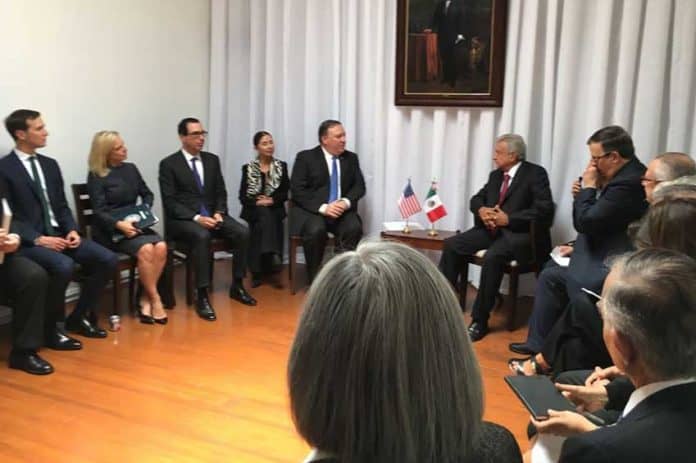July 13, 2018 could go down in history as the day that marked the start of a new, more positive era in bilateral relations between Mexico and the United States.
A delegation of high-ranking U.S. officials led by Secretary of State Mike Pompeo traveled to Mexico City today to meet with President Enrique Peña Nieto and president-elect Andrés Manuel López Obrador.
Pompeo made it clear that the purpose of the trip was to begin to repair relations that have been strained by issues including migration, trade and U.S. President Donald Trump’s border wall proposal.
“We wanted to come down here to let you know that President Trump cares deeply for the success of the relationship between our two countries. Our presence here today signals that to you,” he said.
“We know there have been bumps in the road . . . but President Trump is determined to make the relationship between our peoples better and stronger.”
There are signs that today’s visit went some way to smoothing over the rough road down which bilateral relations have traveled since Trump took office in January 2017.
Mexico’s future foreign affairs secretary described the meeting between López Obrador and Pompeo as “frank, respectful and cordial.”
Marcelo Ebrard, who López Obrador announced as his prospective chief diplomat last week, told a press conference that the incoming administration has “reasonable optimism” that Mexico will be able to find common ground with its northern neighbor and have a good relationship in the coming years.
Ebrard said the president-elect submitted a proposal for the future of the bilateral relationship to the Pompeo-led delegation, which also included Treasury Secretary Steven Mnuchin, Homeland Security Secretary Kirstjen Nielsen and senior White House advisor Jared Kushner, who has played a central role in U.S. relations with Mexico since his father-in-law became president.
López Obrador’s proposal covered a range of issues including NAFTA, migration, security and development, Ebrard said.
He explained that further detail about the proposal would only be made public once a formal response has been received from the United States administration, although he revealed that an overarching aim of a new bilateral relationship is for no Mexican “to have to emigrate because of poverty or insecurity.”
The border wall proposal and the illegal trafficking and smuggling of weapons between the two countries were not discussed, he added.
At an earlier meeting, Peña Nieto urged the American delegation to quickly reunite migrant families that have been separated at the United States’ southern border and stressed the need to find a “permanent alternative that prioritizes the wellbeing and rights of minors.”
A statement released by the president’s office also said that Peña Nieto advised the U.S. delegation that the July 1 elections were “exemplary” and “a sign of the democratic maturity of our country.”
In addition, the president expressed concern about the recent attack on a 92-year-old Mexican man in Los Angeles, California, asserting that such incidents “encourage a climate of hate and racism that we must avoid.”
The statement concluded by saying that Peña Nieto had emphasized the government’s willingness to continue to negotiate an updated North American Free Trade Agreement (NAFTA) with the objective of completing a deal as soon as possible.
Representatives of both governments agreed to “move forward constructively” on the renegotiation process that has been characterized by the United States’ hardline stance aimed at achieving a more favorable incarnation of the 24-year-old agreement.
López Obrador has said that he will support Mexico’s negotiation team during the five-month transition period before he is sworn in on December 1.
Security was tight in the capital today for the diplomatic meetings but it didn’t stop a group of people protesting against Trump’s “zero tolerance” immigration policy near López Obrador’s transition headquarters in the neighborhood of Roma.
Protesters jeered as Pompeo’s motorcade approached the modest offices and held up signs with messages including “Where are our children?” and “Trump, no more migrant children separated from their families!”
Even though López Obrador and Trump are on opposite ends of the political spectrum, some analysts believe that the two leaders might defy the odds and develop a constructive, if not overly friendly, relationship.
López Obrador has emphasized the importance of that relationship and has declared that his government will be respectful of the Trump administration. But he has also said that Mexico in turn will also demand respect and that the country will not be the piñata of any foreign government.
One person who is confident that happier days are ahead is the U.S. Republican Party’s representative in Mexico.
“It’s a clear sign from the government of the United States, that just days after Andrés Manuel López Obrador won the election, a delegation of three secretaries and Jared Kushner are in Mexico,” Larry Rubin said in a message issued today.
“The bilateral relationship is entering a new and very positive era for both nations.”
